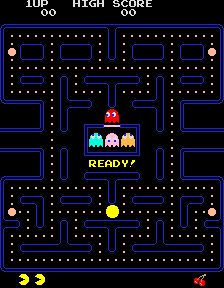
Written for "The Unlikely Muse"
Houston Sidewalk, August 1998
From the 'ping' of Pong to the 'bleep' of PacMan, the sounds and images of video games are the cherished memories of children born since the 1970s. Producing a pale-skinned generation with acute motor skills, beefy thumbs and the ability to "tune out" any peripheral activity, video games have had both their opponents (parents) and their champions (kids). Whichever side of the digital divide you stand on, this annual $10 billion business has left a lasting impression that has nostalgic young collectors paying top dollar for arcade dinosaurs like Asteroids, Centipedes, Defenders and Galaga.
Though determining the first video game is still an issue for heated debate, most experts will tell you it was either William Higin-Botham's 1958 "tennis game" developed at Brookhaven National Laboratories, New York, or MIT graduate student Steve Russell's 1962 "Spacewars". In either case, an enterprising company named Atari took the ping pong ball and ran with it.
Today you can peek into arcade game history in the warehouse at Houston Game PCB Repair Center in the Heights, a specialized fix-it shop for wayward electronic games. Vazric Grigorian, the shop proprietor, has been "repairing boards" since 1974 when he was an electrical engineering student paying his way through school at University of Houston. Grigorian worked for a Houston-based company called H.A. Franz, a vending distributor that carried Atari's sought-after 'Pong' game. In the 80s, Grigorian worked privately as a "game consultant", researching new products and making recommendations to prospecting companies. Now with back issues of RePlay Extra piled up in his office, and hundreds of arcade games and their guts exposed in the back, Grigorian says confidently, "There's nothing we can't fix."
The tools of the game repair trade are similar to those of a TV repair shop: screwdrivers, soldering irons, oscilloscopes and volt meters. Mammoth green and silver motherboards are filed systematically on shelves while a few crouched over technicians peer into the bellies of Star Trek and Ms. PacMan. And just about every landmark game is warehoused in Grigorian's endless repository. A stroll down the peculiarly quiet aisles past Stargate and Space Invaders will leave you hankering for a roll of quarters.

No comments:
Post a Comment